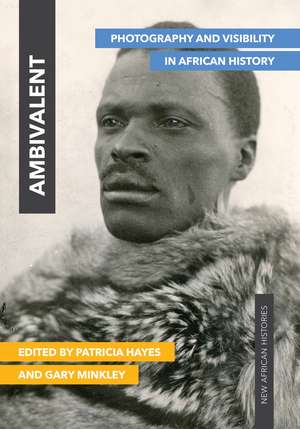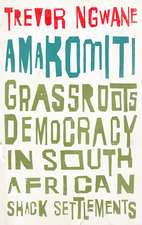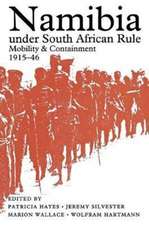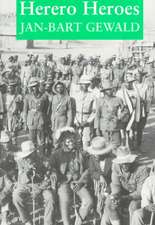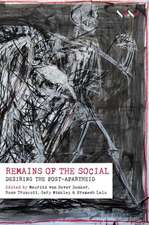Ambivalent: Photography and Visibility in African History: New African Histories
Editat de Patricia Hayes, Gary Minkleyen Limba Engleză Paperback – 11 noi 2019
Going beyond photography as an isolated medium to engage larger questions and interlocking forms of expression and historical analysis, Ambivalent gathers a new generation of scholars based on the continent to offer an expansive frame for thinking about questions of photography and visibility in Africa. The volume presents African relationships with photography—and with visibility more generally—in ways that engage and disrupt the easy categories and genres that have characterized the field to date. Contributors pose new questions concerning the instability of the identity photograph in South Africa; ethnographic photographs as potential history; humanitarian discourse from the perspective of photographic survivors of atrocity photojournalism; the nuanced passage from studio to screen in postcolonial digital portraiture; and the burgeoning visual activism in West Africa.
As the contributors show, photography is itself a historical subject: it involves arrangement, financing, posture, positioning, and other kinds of work that are otherwise invisible. By moving us outside the frame of the photograph itself, by refusing to accept the photograph as the last word, this book makes photography an engaging and important subject of historical investigation. Ambivalent‘s contributors bring photography into conversation with orality, travel writing, ritual, psychoanalysis, and politics, with new approaches to questions of race, time, and postcolonial and decolonial histories.
Contributors: George Emeka Agbo, Isabelle de Rezende, Jung Ran Forte, Ingrid Masondo, Phindi Mnyaka, Okechukwu Nwafor, Vilho Shigwedha, Napandulwe Shiweda, Drew Thompson
As the contributors show, photography is itself a historical subject: it involves arrangement, financing, posture, positioning, and other kinds of work that are otherwise invisible. By moving us outside the frame of the photograph itself, by refusing to accept the photograph as the last word, this book makes photography an engaging and important subject of historical investigation. Ambivalent‘s contributors bring photography into conversation with orality, travel writing, ritual, psychoanalysis, and politics, with new approaches to questions of race, time, and postcolonial and decolonial histories.
Contributors: George Emeka Agbo, Isabelle de Rezende, Jung Ran Forte, Ingrid Masondo, Phindi Mnyaka, Okechukwu Nwafor, Vilho Shigwedha, Napandulwe Shiweda, Drew Thompson
Din seria New African Histories
-
 Preț: 226.37 lei
Preț: 226.37 lei - 19%
 Preț: 479.49 lei
Preț: 479.49 lei -
 Preț: 230.41 lei
Preț: 230.41 lei -
 Preț: 213.37 lei
Preț: 213.37 lei -
 Preț: 276.18 lei
Preț: 276.18 lei -
 Preț: 251.88 lei
Preț: 251.88 lei -
 Preț: 228.77 lei
Preț: 228.77 lei -
 Preț: 223.97 lei
Preț: 223.97 lei -
 Preț: 251.88 lei
Preț: 251.88 lei -
 Preț: 223.58 lei
Preț: 223.58 lei -
 Preț: 231.50 lei
Preț: 231.50 lei -
 Preț: 223.97 lei
Preț: 223.97 lei - 18%
 Preț: 187.59 lei
Preț: 187.59 lei -
 Preț: 308.25 lei
Preț: 308.25 lei -
 Preț: 216.48 lei
Preț: 216.48 lei -
 Preț: 230.83 lei
Preț: 230.83 lei -
 Preț: 215.05 lei
Preț: 215.05 lei -
 Preț: 215.75 lei
Preț: 215.75 lei -
 Preț: 251.72 lei
Preț: 251.72 lei -
 Preț: 230.41 lei
Preț: 230.41 lei -
 Preț: 252.71 lei
Preț: 252.71 lei -
 Preț: 278.09 lei
Preț: 278.09 lei -
 Preț: 280.34 lei
Preț: 280.34 lei -
 Preț: 294.80 lei
Preț: 294.80 lei -
 Preț: 292.83 lei
Preț: 292.83 lei -
 Preț: 258.32 lei
Preț: 258.32 lei -
 Preț: 274.27 lei
Preț: 274.27 lei -
 Preț: 280.05 lei
Preț: 280.05 lei -
 Preț: 275.98 lei
Preț: 275.98 lei - 23%
 Preț: 480.51 lei
Preț: 480.51 lei -
 Preț: 293.04 lei
Preț: 293.04 lei -
 Preț: 273.85 lei
Preț: 273.85 lei -
 Preț: 272.32 lei
Preț: 272.32 lei - 23%
 Preț: 477.86 lei
Preț: 477.86 lei -
 Preț: 257.94 lei
Preț: 257.94 lei - 23%
 Preț: 473.41 lei
Preț: 473.41 lei -
 Preț: 271.39 lei
Preț: 271.39 lei -
 Preț: 260.45 lei
Preț: 260.45 lei -
 Preț: 275.98 lei
Preț: 275.98 lei -
 Preț: 274.27 lei
Preț: 274.27 lei - 23%
 Preț: 472.21 lei
Preț: 472.21 lei
Preț: 256.81 lei
Nou
Puncte Express: 385
Preț estimativ în valută:
49.15€ • 53.37$ • 41.28£
49.15€ • 53.37$ • 41.28£
Carte disponibilă
Livrare economică 01-15 aprilie
Livrare express 15-21 martie pentru 53.11 lei
Preluare comenzi: 021 569.72.76
Specificații
ISBN-13: 9780821423943
ISBN-10: 0821423940
Pagini: 376
Ilustrații: 78
Dimensiuni: 178 x 254 x 23 mm
Greutate: 0.86 kg
Editura: Ohio University Press
Colecția Ohio University Press
Seria New African Histories
ISBN-10: 0821423940
Pagini: 376
Ilustrații: 78
Dimensiuni: 178 x 254 x 23 mm
Greutate: 0.86 kg
Editura: Ohio University Press
Colecția Ohio University Press
Seria New African Histories
Recenzii
“Ambivalent develops a powerful and coherent set of arguments about the inherent ambiguities of photographs and photographic interpretations, in both colonial and post-colonial settings. These arguments are especially impressive in the ways in which they both draw on ‘classic’ photographic theory and engage with contemporary debates in the field of African visual studies, unsettling received wisdoms about African histories, governance, and ‘modern’ personhood.”—Richard Vokes, University of Western Australia
“Scholars interested in further understanding the ways in which photography can be used as a historical source will be inspired and motivated by the diversity of approaches within this book. While this volume is not necessarily a handbook for beginning scholars, its significance, nonetheless, lies in its critical approach and in the new questions it raises regarding the theorization of visibility, photography, and African History.”—H/Soz/Kult
Notă biografică
Patricia Hayes is National Research Foundation SARChI (South African Research Chairs Initiative) Chair in Visual History and Theory at the Centre for Humanities Research, University of the Western Cape in South Africa. She has published extensively on colonial and documentary photography in southern Africa.
Gary Minkley is National Research Foundation SARChI (South African Research Chairs Initiative) Chair in Social Change in the History Department at the University of Fort Hare in South Africa. Recent publications include the coauthored Unsettled History: Making South African Public Pasts.
Gary Minkley is National Research Foundation SARChI (South African Research Chairs Initiative) Chair in Social Change in the History Department at the University of Fort Hare in South Africa. Recent publications include the coauthored Unsettled History: Making South African Public Pasts.
Descriere
Ambivalent makes photography an engaging and important subject of historical investigation. Contributors bring photography into conversation with orality, travel writing, ritual, psychoanalysis, and politics, with new approaches to questions of race, time, and postcolonial and decolonial histories.
